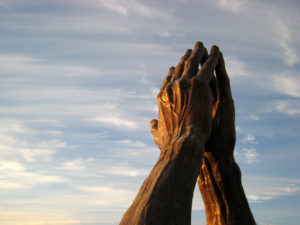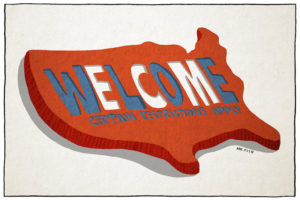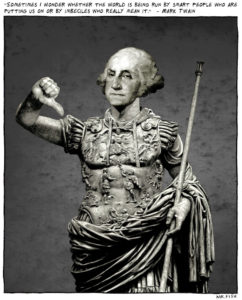A Holiday for American Immigrants
The turkey may share the table with lasagna or guacamole or Asian-style rice bowls. Welcome to America, Pilgrim.WASHINGTON — Years ago, back when turkey was brought home rock-solid from the grocery freezer having never roamed a free range, and before celebrity cooks invaded our family rooms, imploring us to dress up this Thanksgiving dish or that, we ate lasagna.
Not the Giada De Laurentiis version, an upscale arrangement of butternut squash and exotic herbs that no Italian-American home cook, back then, stocked. It was lasagna rich with ricotta and homemade pasta sauce and sometimes accompanied, even on Thanksgiving, with meatballs and sausages that had simmered slow and long. Otherwise, my mother would say, the sauce would be “tasteless.”
The lasagna sometimes was preceded by a heavy platter of antipasto — meats and cheese and cured olives and marinated vegetables and roasted red peppers and, well, you name it. Only after these two courses were cleared would the turkey be brought forth.
The bird was not exactly an afterthought, but it certainly was not the star of some Norman Rockwell moment. Still, a turkey was required to make it Thanksgiving — or maybe to make us more American, which is, after all, what Thanksgiving is supposed to do.
It is worth remembering this as our nation is pained again by one of our recurring arguments over immigration. This miserable dispute has gone on through most of our history and more often than not pits those with white skin and easily pronounceable names of Anglo-Saxon origin against those with darker skin and names that assault some people’s ears with their irregularity.
The New York Times reported recently that the Hispanic surnames Garcia and Rodriguez have made it to the top 10 list of most common American names. Close behind, according to the Census Bureau, are Martinez (11) and Hernandez (15). On their heels are Lopez (21) and Lee (22), a common name among Chinese and Korean immigrants. Unlike European immigrants who changed their names to assimilate — or who had them changed by officials at Ellis Island, or by parochial school nuns or public school principals — today’s immigrants retain this signature of ethnic identity.
The melting pot bubbles vigorously. That is how Thanksgiving began.
Whether you are a purist who considers the meal shared by English Pilgrims and Wampanoag Indians in Massachusetts to have been the first multicultural feast, or a revisionist who considers a similar, earlier meal between Englishmen and natives near the James River in Virginia to be the true start of the holiday, a mixing — or clash — of cultures is at its heart. Successive waves of European settlers would go on to destroy or decimate Native American civilizations, a darkness too little acknowledged in our sanitized memory.
At least the political struggle to define what it is to be American seems to pause on Thanksgiving. Unlike Christmas, Thanksgiving is a chance to have a party that holds no religious significance. Nor does it carry patriotic symbolism, like Independence Day. And so, just as my first-generation parents began their meal with the prerequisites of a full Italian repast, so do today’s immigrants embrace Thanksgiving while making it their own.
Some Muslims seek turkeys slaughtered according to Islamic law, and bathe the bird in lemon and olive oil before roasting. The Vietnamese women in my neighborhood always cook a communal meal, centered not so much on the turkey but on soups and assorted rice-bowl accompaniments.
You could fill a cookbook — or two or three — with Latin American variations on the Thanksgiving theme. I stumbled the other day on a recipe for cranberry-avocado sauce, a sort of Pilgrim’s guacamole. The tortilla chips and salsa to be consumed while watching hours of football are themselves culinary immigrants. The corn for such chips was grown centuries ago by Native Americans, a skill they famously passed to the Pilgrims, who were starved and sick at the time of the first Thanksgiving and in desperate need of agricultural skills.
Perhaps there is nothing about Thanksgiving — not the near-universal day off, not the warmth of roasted turkey and baked pies, not the gravitation to the television for football (a tribal rite, itself) that will cool down our current red-hot rhetoric over immigration. We should just be grateful for a day when families try not to be the Americans of myth, but the Americans they are — or are to become.
Marie Cocco’s e-mail address is mariecocco(at)washpost.com.
© 2007, Washington Post Writers Group
Your support matters…Independent journalism is under threat and overshadowed by heavily funded mainstream media.
You can help level the playing field. Become a member.
Your tax-deductible contribution keeps us digging beneath the headlines to give you thought-provoking, investigative reporting and analysis that unearths what's really happening- without compromise.
Give today to support our courageous, independent journalists.





You need to be a supporter to comment.
There are currently no responses to this article.
Be the first to respond.